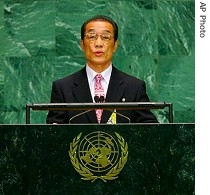2006年VOA标准英语-North Korea Rejects Nuclear Talks, Blames US(在线收听)
By Peter Heinlein
United Nations
26 September 2006
A top North Korean official has ruled out a return to six-party talks on its nuclear program, and accused the United States of trying to rule the world.

North Korean deputy FM Choe Su Hon at UN
The verbal broadside came during North Korea's annual address to the U.N. General Assembly.
North Korea's deputy foreign minister, Choe Su Hon, blamed what he called the "vicious, hostile policies" of the United States for what he called "touch and go critical tension on the Korean peninsula." Referring to his country by its initials DPRK, Choe said Washington is purposely stoking tensions in a strategy aimed at world domination. "The United States aims to strengthen its armed forces in this region, and thus contain the ever-growing-strong DPRK and neighboring countries within its world supremacy strategy. This is what the real intention of the United States is," he said.
He accused the United States of imposing unjustified financial sanctions on Pyongyang, and said under such conditions, North Korea would not return to the stalled six-party talks on its nuclear program. "It is quite preposterous that the DPRK, under the groundless U.S. sanctions, takes part in the talks of discussing its own nuclear abandonment. This is the matter of principle which cannot tolerate even the slightest concession," he said.
Earlier in the day, the U.S. ambassador to South Korea, Alexander Vershbow, said Washington is prepared to have high-level one-on-one talks with North Korea if Pyongyang returns to the six-party talks. He offered to send Assistant Secretary of State Christopher Hill to Pyongyang for the meeting.
Hill is the chief U.S. delegate to the six-party talks. In the past, the United States had said bilateral meetings could only be held in the context of the nuclear talks.
Washington imposed sanctions on Pyongyang a year ago because of North Korea's alleged involvement in counterfeiting U.S. currency. North Korea responded by calling off the six-party talks, which also involved China, Japan, Russia and South Korea.
Pyongyang declared itself a nuclear weapons state in February of 2005, but has not conducted any tests. It defied international warnings this year by carrying out ballistic missile tests of rockets believed capable of reaching the United States.
The U.N. Security Council reacted with a resolution condemning the tests, and imposing weapons-related sanctions. But North Korea rejected the resolution, and vowed to continue its missile program.